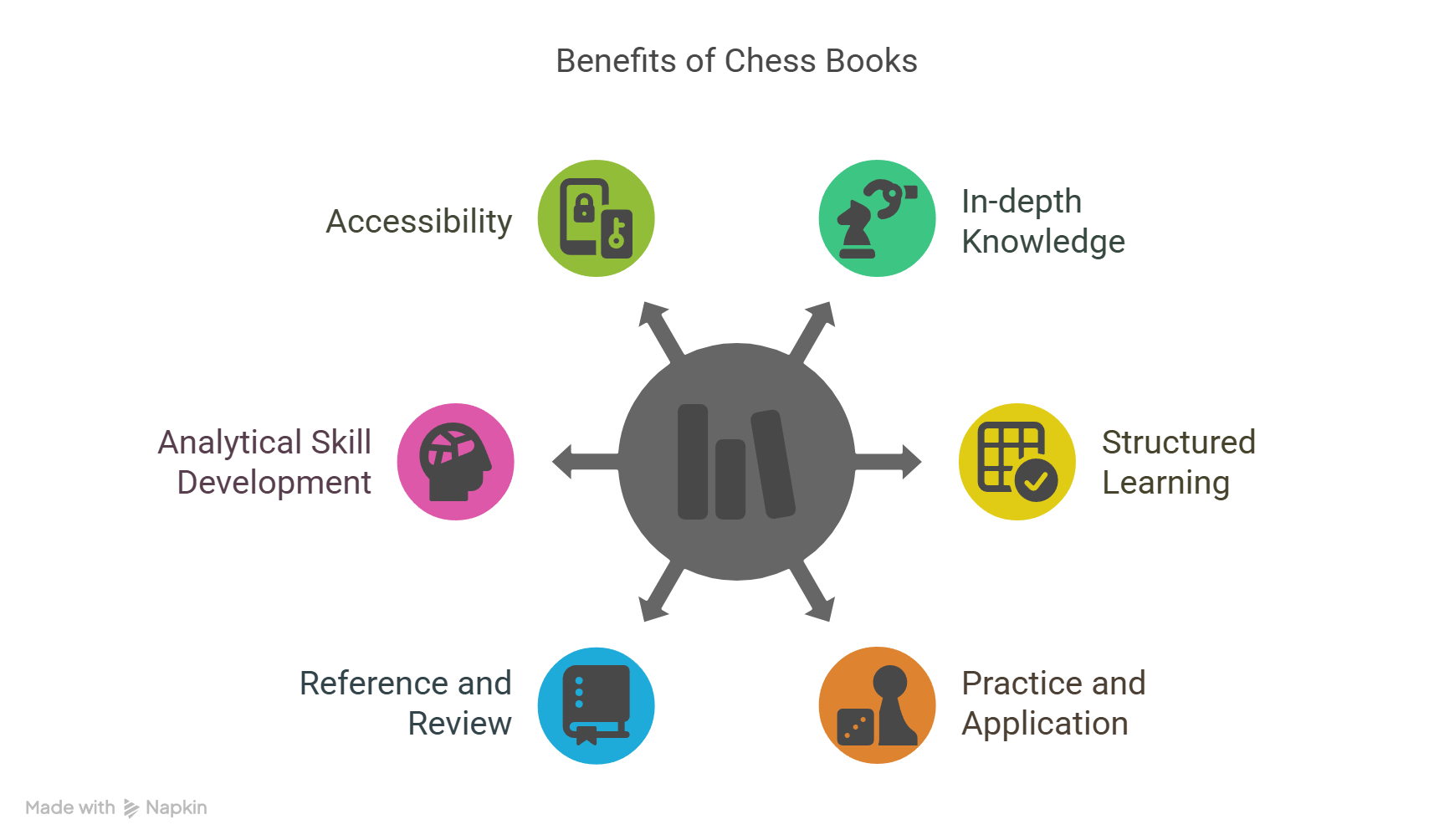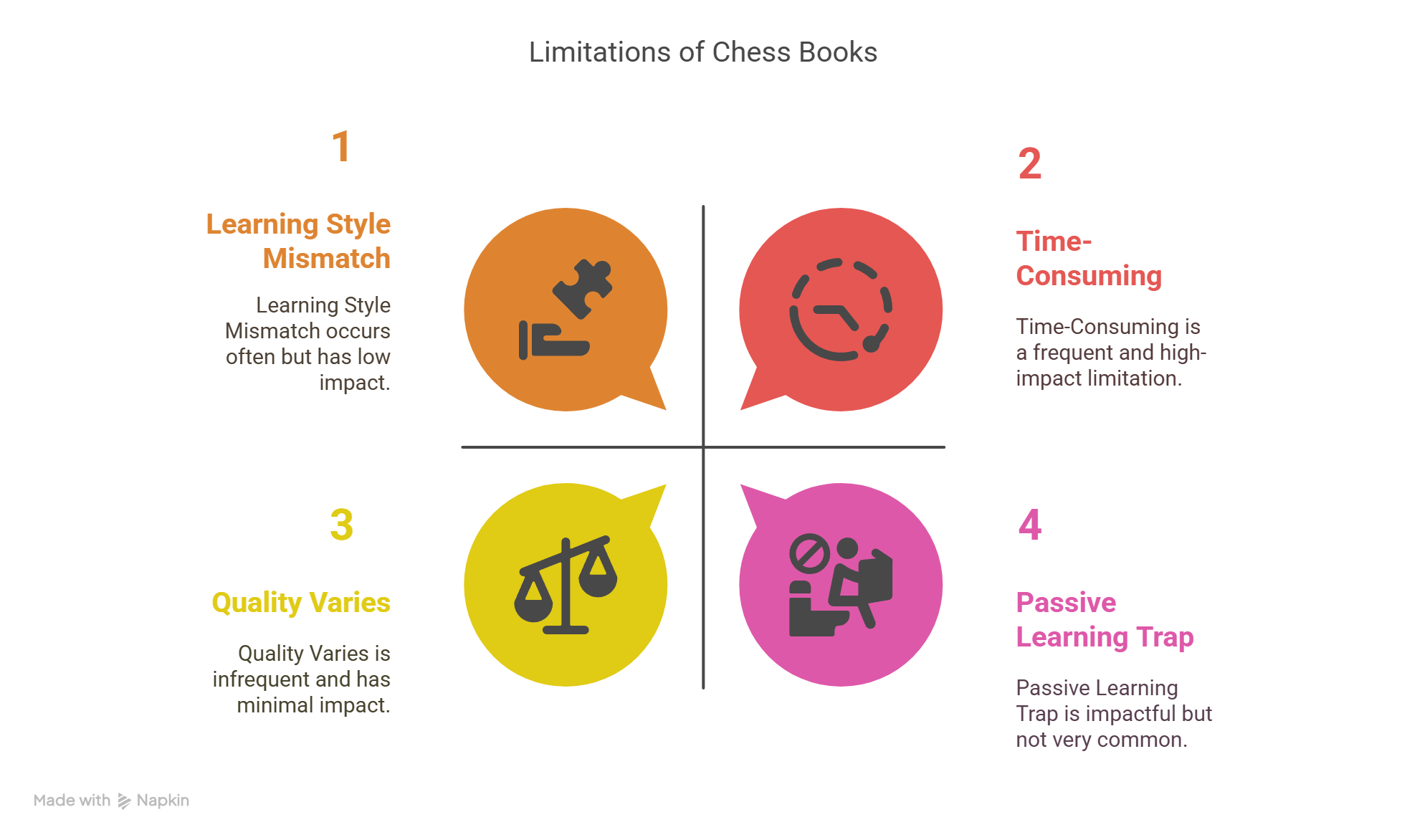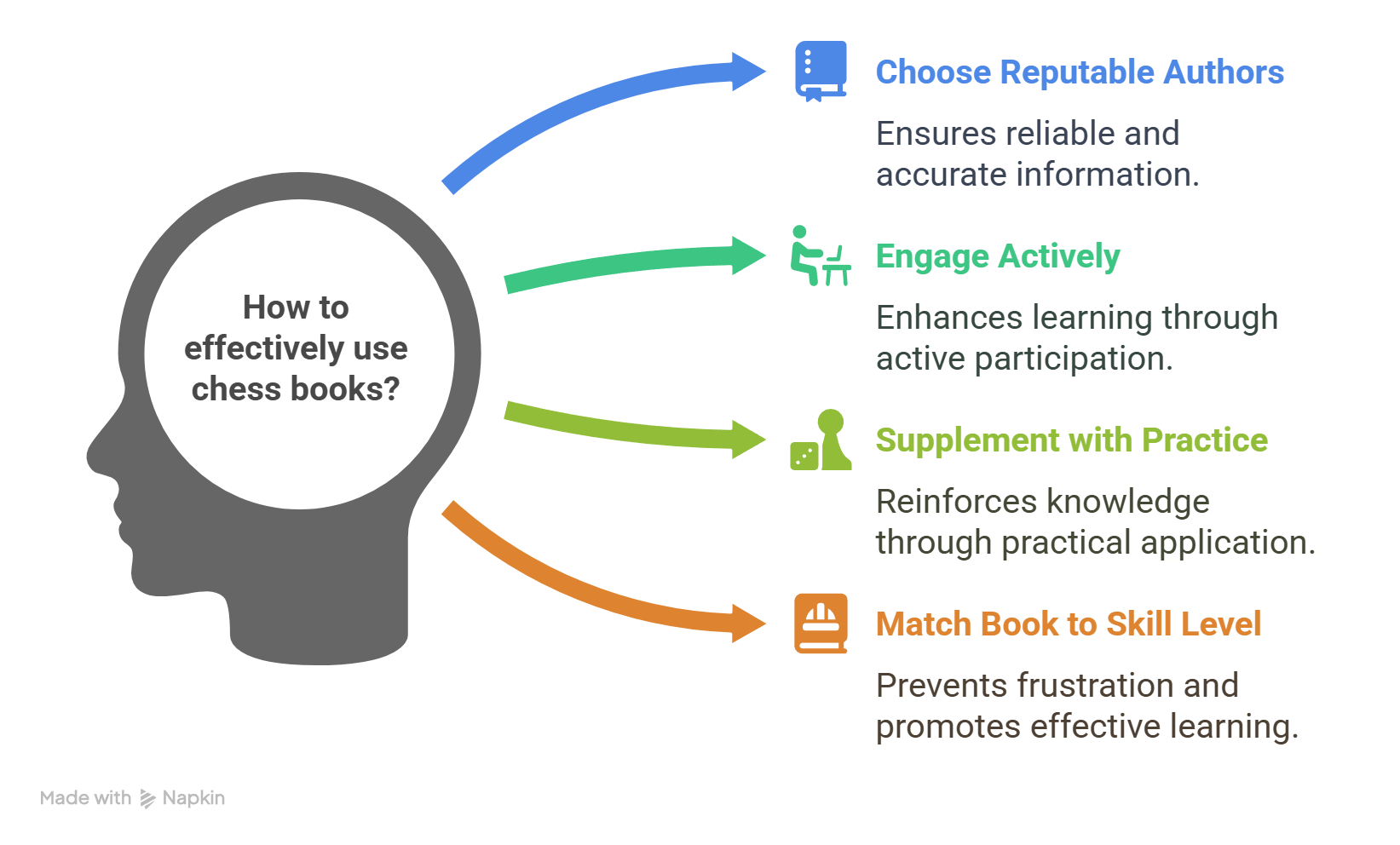Introduction
Chess books have long helped serious players improve their game. For decades, they offered structured learning, deep analysis, and insights from openings to advanced tactics. But with so many online tools and video lessons today, one question remains: Are chess books useful?
In this blog, we’ll explore their relevance in the modern chess world. While new tools emerge, books still offer unmatched depth and structure. Like any resource, they have pros and cons. We’ll break down both to show how chess books can support your learning strategy.

Benefits of Chess Books
In-depth Knowledge and Theory
Chess books are known for deeply exploring key concepts like strategy, tactics, openings, and endgames. Unlike videos or articles, they explain not just the “how” but the “why” behind moves. This helps players understand chess principles and think critically in games.
Classic chess books like My System by Aron Nimzowitsch and The Ideas Behind the Chess Openings by Reuben Fine have stood the test of time. They break down complex ideas into chapters, offering insights into positional play, psychology, and key tactical motifs.
Structured Learning
One of the greatest advantages of chess books is their ability to provide structured learning. Most books are organized to guide readers from basic principles to more advanced concepts, making them an ideal resource for self-learners. Whether you are a beginner seeking to understand the basics of piece movement or an advanced player looking for deeper positional analysis, books often offer a clear path for progression.
If you’re wondering, are chess books useful for self-taught players? The answer is yes – books provide a framework that helps learners progress logically. For self-learners, especially those without access to a coach, the logical flow of a book can provide much-needed direction. The methodical flow from simple to complex helps players build on basics before tackling advanced strategies for better retention.
Practice and Application
Chess books are not just about reading; they are filled with puzzles and exercises designed to reinforce key concepts and sharpen problem-solving skills. These practical exercises allow readers to actively engage with the material, applying what they’ve learned in realistic scenarios. This active engagement is critical for cementing new knowledge and improving at the game.
For example, a chapter on pawn structures might be followed by puzzles that challenge players to identify key ideas in different positions. This practice pushes players to apply lessons beyond theory in their real gameplay. If you’re asking yourself, are chess books useful when it comes to applying knowledge, these exercises are proof that they are more than just theory.
Reference and Review
One of the enduring benefits of chess books is their value as long-term study tools. Unlike videos or online articles that may be harder to revisit, a well-written chess book can be a constant resource, ready to be opened again whenever you need to review a concept or refresh your memory on a particular topic. Whether it’s a forgotten opening idea or a strategy you’ve neglected, books are perfect for quick reference.
The ability to go back and review material is particularly valuable as it reinforces the concepts you’ve already learned, ensuring they become ingrained in your thinking. Over time, this process can lead to a deeper, more intuitive understanding of the game. So, are chess books useful for long-term growth? Absolutely – they’re invaluable when it comes to refreshing concepts or re-exploring strategies.
Analytical Skill Development
Readers often ask, are chess books useful for developing independent thinking? Their focus on self-analysis proves that they certainly are. Reading and working through chess books requires active thinking and analysis, skills that are crucial for improvement. Books encourage players to pause and think critically about why certain moves work and others do not. This reflective thinking process nurtures the ability to assess positions independently, without relying on a chess engine or external advice.
By repeatedly working through problems and analyzing different lines of play, readers develop their analytical skills, which are necessary for evaluating positions and formulating plans during real games.
Accessibility
For many players, chess books are an accessible and cost-effective way to improve. Unlike online courses or hiring a personal coach, books are often more affordable and can be found at a wide range of price points. Additionally, they can be purchased and enjoyed at any time, without the need for internet access or scheduled lessons.
For those who cannot afford premium training resources or who lack access to chess clubs or experienced coaches, books offer a practical solution. With their wealth of knowledge and exercises, they serve as an invaluable resource for players looking to improve at their own pace.

Limitations of Chess Books
Time-Consuming
One of the major limitations of chess books is the time required to study them effectively, especially for beginners. While books offer in-depth coverage of chess concepts, they can be slow to work through, particularly for those just starting their chess journey. For newcomers, a dense chapter on opening theory or pawn structures may seem overwhelming, and they may find themselves struggling to digest the material at the pace they would like. Videos condense lessons into short formats, but books require a slower, more deliberate pace. This extended commitment can feel like a barrier for those eager to improve quickly.
Learning Style Mismatch
Not all players are suited to the traditional book-learning method. Some individuals may find it challenging to absorb information from written texts compared to other learning formats, such as videos or interactive lessons. Books rely on text and diagrams, which may challenge visual or hands-on learners. For these players, videos or interactive resources that provide real-time demonstrations may be more engaging and effective. Chess books also require a level of patience and focus that some players may find hard to maintain, particularly those who prefer more dynamic or immersive learning environments.
Quality Varies
The quality of a chess book can vary significantly, depending on the author’s expertise and the accuracy of the content. Not all chess books are created equal – while many are written by seasoned grandmasters or highly experienced coaches, others may be penned by less experienced writers. This disparity in expertise can result in books that are either outdated or contain inaccuracies. Older books may have outdated theory, while less-expert authors might miss key nuances or explain concepts poorly. The lack of consistent quality means that players must be cautious when selecting books, ensuring they choose works by reputable authors known for their accuracy and depth.
Passive Learning Trap
One of the most significant risks of studying chess through books is the tendency to fall into passive learning. It’s easy to read through a chapter, understand the concepts in theory, and feel as though progress has been made. Without applying lessons – solving puzzles, setting positions, or reviewing games – the material may not improve your play. Passive reading without engagement is unlikely to lead to substantial progress. The real value of books comes when they are combined with active play and practice, reinforcing theoretical knowledge through hands-on experience.

Community and Expert Insights
Are chess books useful in today’s interactive world? Experts say yes – books offer deep insights that digital tools can miss. Many players and instructors find books valuable, especially as part of a broader study plan. Chess books provide structured, in-depth learning that other formats often lack. They help understand great players’ thinking, analyze annotated games, and explore strategic ideas beyond basic tactics. Books let players study at their own pace, more deeply than quick lessons or videos. In forums, the question “are chess books useful?” often comes up, with most agreeing they are when combined with active practice.
However, experts agree books shouldn’t be the only resource. Success comes from engaging actively – setting up positions, solving exercises, and reviewing games to apply concepts. Combining book study with practical play leads to real improvement.
There’s debate over books versus interactive learning or coaching. Books offer deep analysis and structure, while interactive tools give instant feedback and personalized guidance. Some players prefer interactive methods for faster progress, but books remain a valuable complement. The best approach blends both, letting players benefit from each style.
Best Practices for Using Chess Books
Choose Reputable Authors
When selecting chess books, it’s crucial to choose works by credible and experienced authors. Well-known chess grandmasters, coaches, or authors with a proven track record of teaching and analysis can offer valuable insights that are grounded in experience and accuracy. Books written by reputable authors are more likely to be thoroughly researched, up-to-date, and insightful, ensuring that the material you study is both correct and relevant. Some examples of highly respected authors include Aron Nimzowitsch, Reuben Fine, and Garry Kasparov. Choosing books from these reliable sources helps you avoid outdated or inaccurate information, ensuring that your studies are based on sound principles.
Engage Actively
Simply reading through a chess book won’t lead to improvement unless you actively engage with the material. The most effective way to learn from a book is to practice the concepts as you go. Set up positions on a physical or digital chessboard and attempt to solve puzzles and exercises presented in the book. This active participation helps you internalize the ideas and solidify your understanding. Reviewing games – either those found in the book or your own – is another way to deepen your learning. By analyzing positions and moves on the board, you begin to understand not just the “what,” but the “why” behind the strategies and tactics, which enhances your overall chess thinking.
Supplement with Practice
Books provide excellent theory and analysis, but they must be supplemented with practical play to be truly effective. After studying a chapter or concept, try to apply what you’ve learned in your own games. Whether through casual play or more serious competitions, actively practicing and testing out new ideas will help you understand how to use them in real scenarios. Furthermore, self-analysis of your own games is an essential part of this process. By reviewing your play and identifying mistakes or areas for improvement, you gain a deeper understanding of how to apply the lessons from the book in a practical, dynamic setting. Combining book study with regular play is key to making progress.
Match Book to Skill Level
Selecting a chess book that aligns with your current skill level is essential for getting the most out of your study. Beginners should start with foundational texts that cover the basics of chess, such as piece movement, basic tactics, and elementary opening principles. Books aimed at beginners or intermediate players will often focus on these core concepts, providing the structure and clarity necessary for building a strong chess foundation. Advanced players, on the other hand, can benefit from books that dive deeper into complex strategy, endgame theory, and positional play. By choosing books that match your skill level, you ensure that the material is appropriately challenging and engaging without being overwhelming. You can find my book recommendations by level, along with tips on how to study chess books, in my blog post How to Study Chess Books.

Conclusion
Chess books remain invaluable for players seeking structured, in-depth study and self-paced improvement. They offer rich knowledge on strategy, tactics, and game analysis, helping players deepen their understanding. Books especially benefit those who prefer a methodical learning approach, allowing thorough exploration at their own pace.
However, chess books have limits – such as being time-consuming, not fitting all learning styles, and requiring active engagement. They should be part of a broader study plan, combined with practical play, puzzles, and game review to apply lessons effectively.
Ultimately, chess books are a powerful improvement tool when used strategically. By choosing good authors, engaging actively, supplementing with practice, and picking books suited to your level, you can maximize their value. So, are chess books useful? When used right, they remain a strong tool for chess improvement.
FAQ
1. Are chess books still relevant in today’s digital age?
Yes, chess books remain a valuable resource for structured and in-depth learning, especially for players who prefer reading and studying theory. They complement other forms of learning, such as online lessons and interactive tools.
2. Can I improve my chess skills just by reading books?
While books are a great tool for learning strategies and concepts, active engagement is key. Practicing with real games, solving puzzles, and reviewing your play are crucial to reinforce what you’ve learned from books.
3. What are the best chess books for beginners?
Beginners should start with books that cover the basics of chess, such as “Bobby Fischer Teaches Chess” or “The Complete Idiot’s Guide to Chess“. These books provide foundational knowledge and are written in an accessible way.
4. How do I choose a good chess book?
Look for books written by credible and experienced authors like Aron Nimzowitsch, Reuben Fine, or Garry Kasparov. Reviews and recommendations from fellow players or coaches can also help guide your choice.
5. Can chess books replace a coach or online lessons?
Chess books are excellent for self-study, but they are most effective when combined with practical play and feedback from a coach or online lessons. A coach can provide personalized guidance, while books offer deep theoretical knowledge.
